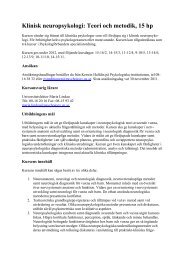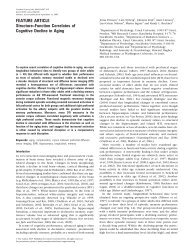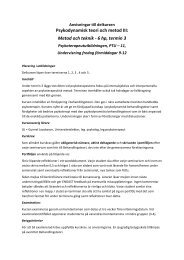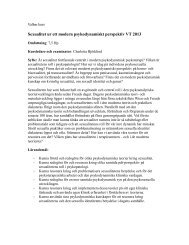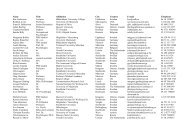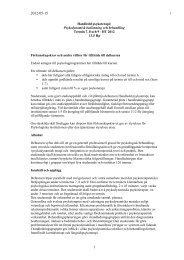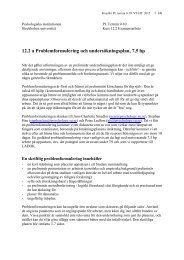Supervisors - Stockholms universitet
Supervisors - Stockholms universitet
Supervisors - Stockholms universitet
Create successful ePaper yourself
Turn your PDF publications into a flip-book with our unique Google optimized e-Paper software.
My worst psychotherapy supervision as<br />
a supervisee<br />
Qualitative and quantitative data from the<br />
Danish DPCCQ study of supervision<br />
Psykoterapi- och handledningsforskning i dialog.<br />
En nordisk konferensoch nätverksbyggande<br />
<strong>Stockholms</strong> Universitet, Oktober 2011<br />
Claus Haugaard Jacobsen<br />
claush@hum.aau.dk
Acknowledgements<br />
• Thanks to<br />
– David Orlinsky, Helge Rønnestad and the SPR<br />
International collaborative Research Network for the<br />
development of the Danish DPCCQ.<br />
– Jan Nielsen, Birgit Bork Mathisen for together with me<br />
to have made the Danish version and collected the<br />
Danish data<br />
– Anne Aagaard Pallesen for her audit on the qualitative<br />
analysis<br />
– The University of Copenhagen, Aalborg University, The<br />
Danish Association for Psychologist and “Det Obelske<br />
familiefond” for fundings
Development of Psychotherapist<br />
Common Core Questionnaire (DPCCQ)<br />
• The DPCCQ is a comprehensive questionnaire<br />
developed by the SPR collaborative network.<br />
• Currently the sample consist of data from<br />
approximately 11,000 psychotherapist from<br />
more than 30 counties.<br />
• The most comprehensive review of the<br />
findings is Orlinsky & Rønnestad (2005).
The Danish DPCCQ<br />
• Supervision is perceived as the second most<br />
influential factor on professional development<br />
and the most influential factor when only<br />
considering novices (Orlinsky & Rønnestad,<br />
2005).<br />
• Thus, the Danish DPCCQ includes a series of<br />
supplementary questions on receiving and giving<br />
supervision plus supervision training:<br />
– 19 items on receiving supervision<br />
– 45 items on giving supervision<br />
– 4 items on supervision training
Supervision can be ineffective or<br />
harmful!<br />
• However, supervision can be a negative learning<br />
experience, too.<br />
• Some supervisees are dissatisfied with the quality of<br />
their supervision and see it as a hindrance or even as<br />
harmful to their professional development (Rønnestad<br />
& Orlinsky, 2000).<br />
• Bad, negative or harmful supervisory events have been<br />
an subject of study during the lastest 15 years:<br />
– i.e. Gray et al. (2001), Jacobsen & Tanggaard (2009),<br />
Nielsen (2011), Reichelt et al. (2009),and Rønnestad &<br />
Ladany (2006).
The present study<br />
• The study I’m presenting today is based on<br />
qualitative analysis of written answers from<br />
252 subjects to the following three questions:
1.<br />
2.<br />
3.<br />
The open-ended questions on the<br />
worst experience in supervision?<br />
What was the worst supervisory experience that you<br />
have had as a psychotherapist?<br />
At what point in your career did this occur?<br />
What impact has it had on your development as a<br />
therapist?
The purpose of the study<br />
• To explore what is considered “my worst<br />
supervision” through inducing meaningful<br />
categories based on the open ended written<br />
statements<br />
• Furthermore, to continue the exploration of<br />
the formed categories by using the<br />
quantitative data from DPCCQ (yet to come)
Numbers of subjects<br />
No. of subjects No. Subj. excl. %<br />
Total number of DPCCQ 385 100 %<br />
Written text 252 65 %<br />
Erroneous answers<br />
(answer as Supervisor or Therapist)<br />
Included relevant written answers<br />
(“My Worst supervision as a supervisee”)<br />
14 4 %<br />
240 62 %<br />
No. of subjects No. Subj. excl. %<br />
Written text 238 100 %<br />
No worst experience as a supervisee 22 9 %<br />
Don’t know 4 2 %<br />
My Worst supervision as a supervisee 212<br />
89 %<br />
55 % of<br />
total<br />
DPCCQ
60%<br />
50%<br />
40%<br />
30%<br />
20%<br />
10%<br />
0%<br />
Theoretical orientation – DK<br />
(n=350 Psychologists)<br />
54%<br />
12%<br />
27%<br />
23%<br />
12%<br />
19,10%<br />
I hvor høj grad følger din terapeutiske praksis følgende teoretiske<br />
orienteringer? ( scoret 4 el. 5 på 0-5 Likert skala)<br />
Analytic<br />
Behav.<br />
Cogn.<br />
Exi/Hum<br />
System.<br />
Other
The Danish sample of WS<br />
- comparable with the total sample<br />
Total Sample<br />
(n = 385)<br />
Valid answers<br />
(n = 212)<br />
Psychologists 360 203<br />
Psychiatrists 25 9<br />
Female 77 % 75 %<br />
Male 23 % 25 %<br />
Mean age 50 yr. 3 mo. 48 yr. 2 mo.<br />
Mean time being<br />
psychotherapist<br />
16 yr. 8 mo. 16 yr. 6 mo.
The statements<br />
• Length of 1 - 149 word<br />
– Average on 17 words<br />
• Some statements contains two or more<br />
distinct examples of worst supervision<br />
• Some statements point at several issues that<br />
made this specific event to be one’s worst<br />
supervision.
THE RESEARCH PROCESS
The qualitative data analysis<br />
• I copied all statement from SPSS and pasted<br />
them into a Word table<br />
• Read them all thought and gave each a<br />
preliminary headline or name<br />
• Reading though once more remembering<br />
some of the preliminary scoring and<br />
sometimes changed one prelim. scoring into<br />
another previously used
The qualitative data analysis<br />
• Next I tried to sort the headlines into bigger<br />
chunks that looked the same or just somehow<br />
related.<br />
• Then I read all the members in a chunk<br />
consecutively<br />
• This lead to former a more comprehensive<br />
concept<br />
– some items were being put into other chunks
The qualitative data analysis<br />
• This process was repeated (sometimes more than<br />
once) until relatively big, consistent and<br />
meaningful categories were induced.<br />
• When I thought I had found a category, I was<br />
going to use, I finally checked membership by<br />
reading each answers and comparing that to the<br />
definition of the category.<br />
• The preliminary coding, organizing, checking, recoding,<br />
etc. is a “Hermeneutic circle” like process
Check on scorings<br />
• I gave a colleague of mine the answers from 99 subjects<br />
– with the four categories seen on the next slide<br />
– without my scorings<br />
• I had scores some of the 99 answers in one of the four<br />
categories<br />
• The remaining answers I had given a preliminary score of<br />
– Prof. incompetent<br />
– Insults/transgressing borders<br />
– Breaches of confidentiality<br />
• The purpose:<br />
– I wanted to see if my scorings in the four categories made sense<br />
and could be replicated.<br />
– I was insecure whether the remaining answers fitted into one or<br />
more of the four given categories
Check on scorings<br />
1 My worst… √<br />
2 My worst…<br />
….<br />
Critique Unempath. All-know. My Way<br />
99 √<br />
√ √<br />
• Overall, there is 4 * 99 scorings, as one can<br />
make more than one score pr. subject = 396<br />
• Out of 396 scorings a comparison showed that<br />
we independently of each other had then<br />
same scoring in 356 instances (90 %)
Check on scorings<br />
• I took that as a fairly good measure of, that<br />
the categories made sense/my scorings were<br />
precise.<br />
• Furthermore, my colleague had herself<br />
invented two additional categories, as she<br />
found that some of the answers couldn’t be<br />
fitted into the four given categories.<br />
• NB: She thought that I had scored all the 99<br />
answers in the four categories.
• Her categories were<br />
Check on scorings<br />
– Unprofessional or Incompetent<br />
– Borders/insults (this included items of breaking<br />
confindentiality)<br />
• Remember, that mine were<br />
– Prof. incompetent<br />
– Insults/transgressing borders<br />
– Breaches of confidentiality
THE RESULTS
No worst experience<br />
• 9 % said they had never had a bad experience in<br />
supervision.<br />
• Furthermore, 2 % didn’t know<br />
– This could be due to no salient worst exp. or several<br />
equally bad experiences.<br />
• Those 11 % (85 % women, 15 % men) has been in<br />
supervision from 2 to 40 yrs. (mean 15 yrs. sd.=<br />
12)<br />
– so they have had their chances for having a “worst<br />
supervision event”
Supervisor gives too little<br />
(n = 28)<br />
• This category contains items dealing with:<br />
– The supervisor<br />
• lacks professional knowledge or skills (incompetent)<br />
• is unengaged, uninspired and uninspiring<br />
• is too neutral, reluctant to speak, interfere<br />
• unchallenging<br />
• falls asleep.<br />
• doesn’t structure the sessions
Supervisor gives too little<br />
- examples<br />
• Even though my supervisor was a licensed specialist in<br />
psychotherapy he was professionally insufficient and theoretically<br />
weak.<br />
• Professional incompetence<br />
• <strong>Supervisors</strong>, who wasn’t any better that me, and whose feedback<br />
wasn’t of any use!<br />
• The supervision was trivial – unimportant.<br />
• The worst were supervisors indifference<br />
• It seemed like the supervisor was being bored<br />
• The supervisor didn’t demand enough from me.<br />
• Diffuse talk about general issues<br />
• The supervisor was completely silent although I put up some specific<br />
problems
Supervisor doesn’t understand T<br />
(n = 33)<br />
• The supervisee experiences that the<br />
supervisor doesn’t<br />
– empathized with or meet in his needs<br />
– understands the case or the supervisee’s<br />
problems
Supervisor doesn’t understand T<br />
- Examples<br />
• To show up with a problem that was totally ignored.<br />
Instead the supervisor steamrolled another issue through<br />
which to me felt completely irrelevant.<br />
• Supervisor didn’t at all understand the case I presented. I<br />
felt misunderstood.<br />
• A supervisor gave tons of advice that was completely<br />
unusable, because she didn’t take time to listen to the case I<br />
presented.<br />
• I was treating a patient with BPD, whom I was afraid of. She<br />
was aggressive and acted out. I didn’t feel that the<br />
supervisor understood how anxious and insecure I was.<br />
• A patient of mine committed suicide. I didn’t fell met or<br />
supported.
Supervisor it critical or looks for errors<br />
(n= 23)<br />
• Supervisor is (too) critical<br />
• Supervisor seems only to look for errors and<br />
mistakes for him to pin point.
Supervisor it critical or looks for errors<br />
- Examples<br />
• A supervisor picked on a bad wording, while I was<br />
telling about a difficult patient.<br />
• A controlling supervisor looking for errors. She<br />
winded, played and stopped my tape recordings<br />
at random and asked in an almost inquisitorial<br />
way why I intervened as I did.<br />
• A very discontent and critical psychologist<br />
• The supervisor was impatient, critical,<br />
judgmental, which made me feel incompetent<br />
and shameful – and even worse – it had a<br />
negative impact on the therapy.
The all-knowing and the belittling<br />
supervisor (n = 32)<br />
• When supervisors<br />
– knows it all, are teaching, lecturing, preaches, or being<br />
educational<br />
• This is found in many grading.<br />
– a very mild form is giving a piece of advice without listening<br />
careful to the supervisee/the case<br />
– most statements is on supervisor thinking they know-it-all or<br />
are a “besserwisser”<br />
• Furthermore, this can turn into belittling, downgrading,<br />
condescending or patronizing<br />
– Included is also when supervisor speaks with disrespect of the<br />
patients (n = 6)<br />
• It seems to be closely related to criticism
The all-knowing, belittling supervisor<br />
-examples<br />
• “When I had an educational supervisor”<br />
• ”I had an all-knowing supervisor, who gave lectures/<br />
pontificated his knowledge.<br />
• ”When supervisor is know-it-all, and speaks slightly<br />
downgrading”.<br />
• “My supervisor were downgrading and correcting me”<br />
• “My supervisor talked down to me and my colleagues.”<br />
• “My supervisor told me that 100 % of what I did was<br />
unqualified”<br />
• “My supervisor once said: You have not even caught the<br />
slightest glimpse of it!”<br />
• “A greedy, arrogant and belittling supervisor”
“Do it my way!” (n = 22)<br />
The dominant, authoritarian supervisor<br />
• The supervisor acts in an authoritarian way,<br />
demanding that the therapy is conducted in a<br />
certain way: My way (the right way) or the<br />
highway!<br />
– Supervisor may sometimes even use threats to<br />
enforce his way.
“Do it my way!”<br />
- Examples<br />
• A supervisor who wanted to realize his own<br />
project. I should work just like him.<br />
• An authoritarian supervisor who insisted on me<br />
working in a specific theoretical reference and<br />
disallowed all other orientations.<br />
• The supervisor scolded me for not following her<br />
instructions<br />
• To be dictated by a dominant supervisor to apply<br />
only one perspective. She said she wanted other<br />
perspectives, but that was not what she actually<br />
did. I felt controlled.
When supervisor is the manager/boss<br />
(n = 16)<br />
• This category deals with situations where the<br />
clinical supervisor is the boss, too.<br />
• Most of these answers has to do with<br />
– the clinical supervisor in supervision steps into the<br />
role of being the leader<br />
– power and it’s misuse (threats).
When supervisor is the manager/boss<br />
– “My clinical supervisor was my boss, too. He couldn’t<br />
separate these two roles”<br />
– “My clinical supervisor suddenly stepped into her role<br />
of being my manager and hinted that I could be<br />
fired”<br />
– “I was forced to have supervision from my boss. She<br />
wanted me to obey and made a direct threat that I<br />
could be fired.” (also a good example of “MY WAY”)
Breakdowns of internal borders of the<br />
supervision (n = 32)<br />
• The supervision is contaminated with personal<br />
and private material either from the<br />
supervisor<br />
– being too open about his own private or personal<br />
life<br />
– indulging in telling his own case experience (n = 6)<br />
– transgressing the supervisee’s borders for<br />
personal or private material<br />
– offending, insulting or hurting the supervisee
Breakdowns in internal SUP-borders<br />
- Examples<br />
• A supervisor who prefered to talk about<br />
himself, his competencies and own cases,<br />
rather than listen to me.<br />
• My supervisor fell in love with me – but I<br />
rejected<br />
• My supervisor humiliated me<br />
• A fight with my supervisor
Breaches in the external frame<br />
(n = 7)<br />
• Supervisor commit a breach of the<br />
professional secrecy/confidentiality (n = 5)<br />
• Supervisor cancels or forgets appointment (n<br />
= 2)
Breaches in the external frame<br />
- Examples<br />
• Once, when my supervisor forgot our appointment.<br />
• My supervisor yelled confidential material from a<br />
supervision session at me when we later on went to a<br />
staff meeting at the ward.<br />
• My former supervisor used confidential information<br />
from the supervision to slander me in the organization.<br />
• My Boss wanted to force me to get supervision from<br />
her, but I refused. Instead the deputy chief did the<br />
supervision. However, after some time I realized that<br />
she told my boss all about it.
Group supervision<br />
- Results -<br />
• Out of the 212 valid answers, 47 explicitly states<br />
that their worst supervision took place in a group<br />
setting.<br />
– Many more examples could be referring to group<br />
supervision, but it’s not explicitly stated.<br />
– The number not surprisingly in itself, as much of (the<br />
training) supervision takes place in groups – perhaps<br />
even the majority (Bernard & Goodyear, 2009)<br />
• However, of the 47 answers in groups 42 point to<br />
something about the group format as the major<br />
reason for this instance became their worst<br />
supervision.
(n = 42 or 20 %)<br />
Group members’ contribution (n=33)<br />
NEGATIVE EMOTIONS: Unsafe/Anxious/Intergroup conflict/Aggression<br />
(17)<br />
UN-EMPATHIC CRITICAL KNOWING: Critique/Belittle/Devaluate/Knowall/know<br />
what should be done (7)<br />
DISTURBING: Too inexperienced/Irrelevant/Unfocused/Bad timing) (4)<br />
(5 is unspecified, but is clearly related to group members)<br />
Supervisees’<br />
contribution (n=6)<br />
NEGATIVE EMOTIONAL<br />
REACTION: Performance<br />
anxiety/Feeling<br />
incompetent/Exposed to<br />
ridicule/Misunderstood (6)<br />
Group processes<br />
<strong>Supervisors</strong>’<br />
contribution (n=12)<br />
NEGLECT GROUP PROCES: Do not<br />
structure/Regulate/Understand or<br />
talk about the process when<br />
needed (12)
Group process<br />
- Examples<br />
• Conflicts from other settings between the group members made<br />
me/the group ill at ease – especially because no one spoke of it<br />
• The supervisor did not include the group process<br />
• The supervisor was completely without touch of the group process<br />
• A group member interfered untimely<br />
• I was aggressively attacked by a group member. The supervisor was<br />
passive. I felt deeply hurt, but didn’t have a chance to defend myself<br />
as it was at the termination of the group<br />
• I was terrified and paralysed with performance anxiety in a<br />
supervision group<br />
• One of my colleagues gave me supervision in a group of close<br />
colleagues. The colleague/supervisor was intimidating and<br />
downgrading. Neither the responsible psychologist nor the group<br />
helped me. I was being open, honest and insecure. It turned into an<br />
“absurd group rape”. Afterward no one picked up on it.
When bringing a difficult patient to<br />
supervision (n = 10)<br />
• Discusses difficult cases<br />
– Severely psychopathology, aggressive, acting out<br />
(n = 7)<br />
– Patients, who have committed suicide (3)<br />
– and not feel helped, met, understood…
Negative reactions in the supervisee<br />
(n = 15)<br />
• When the supervisee feels<br />
– anxious<br />
– cries<br />
– ashamed to one-self<br />
– incompetent
Negative reactions in the supervisee<br />
- Examples<br />
• I had a feeling of as a person to be incompetent<br />
to be a psychologist<br />
• I felt like a bad psychologist, who hadn’t<br />
understood the client, I brought to supervision<br />
• To feel a shamed to me self and my mistakes<br />
• To realize that I could have done much better.<br />
• To feel methodological ”stupid”<br />
• When I was afraid of a supervisor, whom I saw as<br />
being perfect.
120<br />
100<br />
80<br />
60<br />
40<br />
20<br />
0<br />
Year of experience a therapist<br />
Total sample (n=378/385)<br />
0-1½ yr. 1½-3½ 3½-7 7 to 15 15-25 25-45
70<br />
60<br />
50<br />
40<br />
30<br />
20<br />
10<br />
0<br />
Year of experience of therapist<br />
- The WS sample (n=209/212)<br />
0-1½ yr. 1½-3½ 3½-7 7 to 15 15-25 25-45
100<br />
Currently in supervision x Experience<br />
Danish sample<br />
90<br />
80<br />
70<br />
60<br />
50<br />
40<br />
30<br />
20<br />
10<br />
0<br />
Total 0-5 yr. 5-10 yr. 10-15 yr. 15-20 yr. 20-25 yr. 25-30 yr. 30 + yr.
Supervision last 12 mth. / exp.<br />
How many hours of supervision have you received for all your cases in the last 12 mths?<br />
0 hrs.<br />
1-10 hrs.<br />
11-20 hrs.<br />
21-30<br />
31-40<br />
41-60<br />
61-90<br />
90+ hrs.<br />
0-5 yrs.<br />
5-10 yrs.<br />
10-15 yrs.<br />
15-20 yrs.<br />
20-25 yrs.<br />
25-30 yrs.<br />
30 + yrs.
When did I have my worst supervision exp. ?<br />
80<br />
70<br />
60<br />
50<br />
40<br />
30<br />
20<br />
10<br />
0<br />
Years as psychotherapist when WS occurred<br />
40%<br />
23 %<br />
21 %<br />
18 %<br />
6 %<br />
3 %<br />
0 - 1,5 yr. 1,5 - 3,5 yr. 3,5 - 7 yr. 7 - 15 yr. 15 - 25 yr. 25 - 45 yr.
9<br />
8<br />
7<br />
6<br />
5<br />
4<br />
3<br />
2<br />
1<br />
0<br />
- No WS experience (n = 25)<br />
Years of experience as Th.<br />
0-1½ yr. 1½-3½ 3½-7 7 to 15 15-25 25-45
120<br />
100<br />
80<br />
60<br />
40<br />
20<br />
0<br />
Impact of worst supervision?<br />
14 %<br />
15 %<br />
30 31<br />
53 %<br />
20<br />
14 %<br />
No impact Negative Learng/Self-Conf Choice of Sup.<br />
89<br />
43 %<br />
18 %<br />
37
60<br />
50<br />
40<br />
30<br />
20<br />
10<br />
0<br />
Impact of worst supervision?<br />
15 15<br />
WS 0-3½ yrs.<br />
No impact Negative Learng/Self-Conf Choice of Sup.<br />
11<br />
41<br />
37
35<br />
30<br />
25<br />
20<br />
15<br />
10<br />
5<br />
0<br />
Impact of worst supervision?<br />
7 6<br />
WS 7-45 yrs.<br />
No impact Negative Learng/Self-Conf Choice of Sup.<br />
7<br />
22<br />
17
WS: Negative impact<br />
• Ever since I been a bit watchful when going to<br />
supervision.<br />
• Even today I find it hard to trust, that a supervisor<br />
will it for the benefit of me<br />
• For a period of time I was held on hold in my<br />
professional development due to high anxiety.<br />
Going to supervision became a matter of ”doing<br />
the right thing” (like supervisor would have done)<br />
and being fearful thinking freely.<br />
• I stopped treating children
Impact: Learned from WS<br />
• A stronger conviction that supervisees in order to grow<br />
need an recognizing, empathic and conflict free space<br />
• I learned how useless it is to give advice unless you<br />
really know their problems/daily life.<br />
• Don’t be too cocksure. Stay humble no matter how<br />
experienced you are.<br />
• I’m very careful about how I express critique. I try to be<br />
respectful, speak in a polite manner, put recognition<br />
very high up.<br />
• I really learned the meaning of a safe frame.<br />
• When I’m supervising, it reminds me of how vulnerable<br />
the supervisee is.
Impact: Self-confidence<br />
• I realized that it necessary to filter the<br />
feedback from the supervisor. It sharpens me<br />
to make my own assessment<br />
• I became more self-confident, which I’ve<br />
never have regretted<br />
• I learned to rely on my own feelings and<br />
intuition<br />
• I’ve learned to say stop and set up limits.<br />
• That I want to decide for my self
DISCUSSION
• The data<br />
Discussion<br />
• The analysis/forming of categories<br />
• The need for an relational approach<br />
– The supervisor’s responsibility, role and function<br />
• Correlations with personal items (i.e family<br />
back ground)?
Supervisor<br />
Agen<br />
da<br />
Cont<br />
rol<br />
Boss<br />
Mangager<br />
Supervision<br />
Group<br />
members<br />
Private<br />
Society<br />
Organisation<br />
Wish<br />
Prob<br />
Supervisee<br />
Patient
S<br />
giver/kan/siger/<br />
gør for lidt<br />
S forstå eller<br />
møder ikke Ts<br />
behov<br />
S uempatisk<br />
Supervisor /<br />
Leder<br />
Kritik<br />
Fejl<br />
Gruppe<br />
Bedrevidende<br />
Nedladende<br />
T negativ reaktion<br />
skam, angst<br />
Ydre ramme om<br />
sup brydes<br />
- Tavshedspligt<br />
- Aflysninger<br />
Pt. syg/suicid<br />
Indre ramme<br />
brydes:<br />
Krænkelser,<br />
personlige grænser<br />
krænkelser<br />
Do it my way!<br />
Dominerende,<br />
autoritær
Remonstrances<br />
• My worst supervision or my worst supervisee?<br />
– We really miss the relational context and<br />
knowledge of what really has been going on.<br />
– We have all met difficult supervisees (cf. Watkins,<br />
1995 on pathological attachment styles in supervisees).
Have you received formal training in supervision<br />
before you started as a supervisor?<br />
300<br />
250<br />
200<br />
150<br />
100<br />
50<br />
0<br />
n = 312<br />
46<br />
15 %<br />
Prior supervision training?<br />
266<br />
85 %<br />
Yes No
Some advice for the supervisor(!)<br />
• Pay extra attention to<br />
– group supervision and the group process<br />
– severely disturbed patients, difficult cases, suicide<br />
• Do never forget to be<br />
– empathic<br />
– regarding<br />
• Do not talk too much about your own cases<br />
• Try to follow the supervisee – where he want<br />
to go





